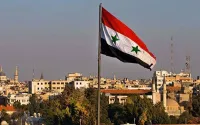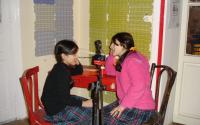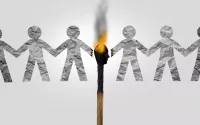5 June 2006Mark LeVine
The new allegations that US marines killed at least fifteen Iraqi civilians is increasing the fear among Americans that we have "lost" Iraq. If the video of blood soaked bedrooms and screaming children continue to headline al-Jazeera, it's hard to imagine how much longer the United States can "stay the course," as President bush continually urges his fellow Americans to do, whether in Iraq or the larger war on terror.
But as I sit in my hotel bar in Casablanca watching a melange of Arab vacationers fume at this latest, profoundly disturbing event, I can't help shaking my head at the debates about "whether" the killings will be the straw that breaks the proverbial camel's back. The Iraqi Prime Minister might have finally awakened to the fact that US soldiers "daily kill Iraqi civilians," but this is not news to his countrymen and women. In fact, it was clear to me during my visit to Iraq over two years ago, at the first anniversary of the invasion, that we had already lost Iraq--in fact, gave it away--almost as soon as we arrived, precisely because of the systematic and brutal violence we had unleashed in the country, and the utter lack of concern for the people of the country and their property it reflected.
This was not what I had hoped to see when I decided to visit the country. While I opposed the invasion, I went to Baghdad hoping to hear stories of rebirth mixed with anger at the atrocities committed by the former regime. But instead of hearing Iraqis recount Hussein's horrors, seemingly every Iraqi I met had a story to tell about a relative injured, jailed, or killed by US forces, almost all for no legitimate reason.
Some bordered on the comical, as when soldiers broke into several houses searching for a teenager whose cell phone conversations with a friend about taking a video game they were playing "to the next level" were intercepted and mistaken insurgents planning a new offensive. Others were much more tragic, such as the elderly Iraqi lawyer whose son, an engineer fluent in English and several other languages, was shot dead by US Soldiers at a check point for supposedly not responding to an order to stop.
And Iraqis were already talking about Abu Ghraib; not because of Saddam's atrocities, but rather because of what everyone knew US personnel were routinely doing to Iraqis, there and in a dozen other detention facilities around the country. As for Falluja, as a cowered in the back of my friend's car during a trip through the city's infamous main street, he reminded me that the town was not always an insurgent strong-hold. In fact, it had resisted attempts by the insurgents to make it a base until US forces fired on unarmed protesters, killing over a dozen for no other reason than exercising the freedom of assembly that the US ostensibly invaded Iraq to bring them.
As for the economic and political "rebirth" President Bush promised Americans and Iraqis alike, the corruption at the core of the occupation administration made economic recovery, let alone political development, impossible to imagine by the invasion's first anniversary. As one senior Iraqi official confided to me, "this has become just like in Saddam's time, only with different faces."
If the situation I am describing was already clear to me in early 2004, it was surely clear to American officials. Perhaps if they'd paid closer attention--or more likely, if they actually thought they represented a problem (many Iraqis saw the chaos as at least partially sponsored by the US to ensure our continued presence in and power over the country), our involvement in Iraq could have been turned around. But they didn't, and the situation become worse by the day.
The disaster of Iraq can teach Americans, if not the Bush Administration, two things if we're willing to listen: First, with few historical exceptions (and Iraq isn't one of them), there is no such thing as a benign occupation. The violence, money and corruption that lurk behind every act of war and occupation make any such outcome impossible. Second, and perhaps more troubling, is that as long as American foreign policy is based upon strategic interests that are seen to conflict with the majority of the world's other inhabitants, more Iraqs and a long and bloody war on terror are inevitable.
Indeed, I write these lines in the safe house of a Moroccan acquaintance, a religious democracy activist currently under threat of arrest from the secret police, who've just begun another round of arrests of young people who criticize the government. This in a country that is continuously lauded by the US as a model of moderation and even movement towards democracy. As one of the country's foremost musicians explained to me, this is perhaps the greatest legacy of President Bush's push for a so-called New Middle East. "Bush stole the word demcoracy, and now the right wing and Islamists say to us, 'Look at what democracy means, is that what you want?' What can we say, especially when the monarchy is so close to your government?"
Americans had better take control of our foreign policy soon, because if the situation across the Middle East continues to deteriorate, Osama bin Laden will be the least of our problems. And it won't just be President Bush's fault, it will be all of ours.
Mark LeVine is a Professor of Modern Middle Eastern History, University of California, Irvine. He is the author of the forthcoming; Heavy Metal Islam; Verso/Random House. Email to: [email protected]. Visit: www.culturejamming.org






